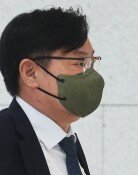Impatient to resolve N. Korea issues, Seoul makes things go awry
Impatient to resolve N. Korea issues, Seoul makes things go awry
Posted April. 05, 2021 08:41,
Updated April. 05, 2021 08:41
High-ranking South Korean, U.S. and Japanese security officials had their first meetup on Friday since U.S. President Joe Biden took office. In a joint statement issued right after the talks, they shared common concerns about North Korea’s nuclear and ballistic missile programs while putting emphasis on the complete implementation of the United Nations Security Council’s resolutions. They seemingly intended to jointly put pressure on North Korea following its recent ballistic missile launch while agreeing on the need to resume the U.S.-North negotiations as soon as possible. Several hours after their trilateral talks, Chinese Foreign Minister Wang Yi said in a meeting with his South Korean counterpart that there should be a clear answer to North Korea’s legitimate security concerns, emphasizing the lessening of sanctions on the regime.
Friday’s security meeting among Seoul, Washington and Tokyo were designed to discuss the Biden administration’s new North Korea policy. Given that they reiterated security concerns due to Pyongyang’s ballistic missile launch on March 25 and called for the complete fulfillment of the U.N. sanctions, it is reasonably expected that Washington may seek a “principled diplomacy” based on close cooperation with its allies and pressure on Pyongyang. However, it will not be an easy job for Washington and Pyongyang to find common ground to get their dialogue back on track as Pyongyang has recently announced to take a “tit-for-tat” strategy. If it is the case, not only the three allies but the international community as a whole should cooperate closely to fully implement North Korea sanctions. The bigger holes the cooperative system against Pyongyang has, the less likely Pyongyang is to give up on its pursuit of nuclear armament.
However, it is worrisome that Beijing and Pyongyang are establishing an ever closer relationship in response to North Korea sanctions than before, a great example of which is shown in Minister Wang Yi’s argument to resolve North Korea’s reasonable security concerns made during his meeting with Seoul. This expression is frequently used by China to emphasize the security of North Korea’s regime and call for the lessening of sanctions on Pyongyang. Regrettably, things ended up in an awkward situation where Seoul’s security head pledged to strengthen bilateral cooperation with Washington and Tokyo in the United States while its foreign minister discussed the lessening of North Korea sanctions with his Chinese counterpart in China. What’s worse, the South Korean foreign affairs ministry announced that China reiterated President Xi’s willingness to visit Seoul but Beijing did not mention it at all in its announcement, only making Seoul seem to desperately beg for Xi’s visit.
It was a rare diplomatic occasion where security talks among Seoul, Washington and Tokyo were held on the same day as the foreign policy meeting between Seoul and Beijing, which may come across diplomatically strange even to Seoul’s allies. It may come as no surprise that Washington and Beijing deliver a contrasting message to each other’s because they have different views of North Korea issues. Even so, Seoul might have intended to persuade Washington to agree to swiftly resume denuclearization talks while ensuring Beijing’s cooperation. However, the South Korean government should realize that North Korean nuclear issues are not resolved with undue haste. It has less leeway to make things work than before because the Biden administration keeps a distance from a “top-down” approach. Under these circumstances, immoderate levels of drive only mess up the situation.
Headline News
- Med professors announce intention to leave hospitals starting Thursday
- Bridge honoring Sgt. Moon Jae-sik unveiled in Pennsylvania
- Chief of Staff Chung tells presidential secretaries to stay away from politics
- US FTC bans noncompete agreements
- N. Korea launches cyberattacks on S. Korea's defense companies







